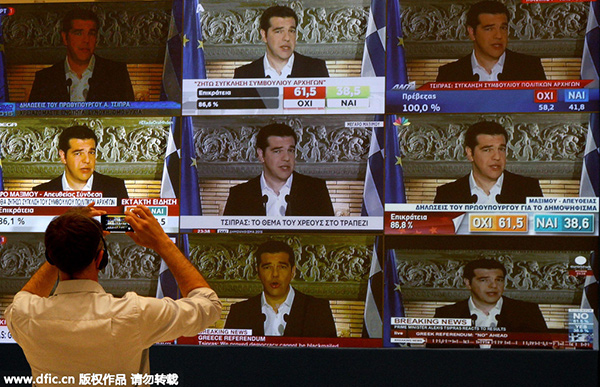 |
|
A Journalists watch Greek Prime Minister Alexis Tsipras speaking on TV after the results of the referendum, at the Zappion conference center in Athens, Greece, July 5, 2015. [Photo/IC] |
* Lenders unlikely to open doors in the coming days
* ECB to keep tight funding steady, sources say
* July 20 is crunch date with big bonds payment due
FRANKFURT - The European Central Bank (ECB) is likely to maintain emergency funding for Greek banks at its current restricted level, people familiar with the matter said on Sunday, a move that will see lenders run out of cash soon.
There is little prospect of the ECB adopting a more generous stance after Greeks voted overwhelmingly to reject the terms of an international bailout meaning that the banks are likely to remain closed in the coming days.
The impending cash crunch belies Greek Prime Minister Alexis Tsipras's ambition to restore the banking system back to health after the 'no' vote.
Although a final decision has yet to be taken and the matter will be the subject of debate when ECB policy setters talk on Monday, they are seen keeping Emergency Liquidity Assistance (ELA) at its current level, leaving Greek banks, and in turn Athens, with little or no room for manoeuvre.
One person said in advance of Greece's rejection in a referendum of bailout terms that a 'no' vote would prompt no immediate action on the provision of funding but make any increase out of the question.
A second person confirmed that the referendum would not trigger a change. Greece's central bank will make an appeal for fresh funding, a central banking source said.
Maintaining the status quo would give Greek banks little time before they use up all of the roughly 89 billion euros of funding available and ensure that they remain closed for at least the coming days as cash runs dry.
Such an outcome jars with Tsipras's pledge on Twitter after the vote that "our immediate priority is to restore our banking system's functioning and economic stability".
Nuclear Option
On Friday, July 3, the head of Greece's banking association spelt out the urgency of the situation, saying that lenders had a "liquidity cushion" of 1 billion euros but that funding beyond Monday depended on the ECB.
"We are coming to the end of the road," said a third person familiar with ECB thinking. "There is no appetite to lend any more. The banks cannot pay back what they owe."